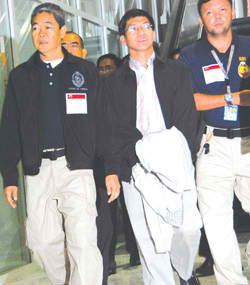THE U.S. Court of Appeals has found probable cause for former Police Officer Michael Ray Aquino to be extradited to the Philippines to stand trial for the Dacer-Corbito double-murder case.
“Upon review of the record, we conclude that competent evidence supports the probable cause finding in this case,” according to a May 3 certified true copy of the court’s judgment affirming the ruling handed down by the District Court for New Jersey last Oct. 14.
“The certified judgment is issued in lieu of a formal mandate and is to be treated in all respects as a mandate,” according to the clerk of court.
The appellate court on April 25 denied Aquino’s third appeal against the extradition requested by the Philippine government under Gloria Aquino in connection with the November 2000 murder of publicist Salvador “Bubby” Dacer and his driver, Emmanuel Corbito.
The U.S. has 60 days to enforce the extradition.
Aquino had challenged the District Court’s decision granting the government petition to extradite him, saying the Arroyo administration had failed to present competent evidence to demonstrate probable cause to believe that he is guilty of conspiracy to commit the double murders.
But the U.S. Court of Appeals for the Third District declared that the lower court “properly denied” Aquino’s petition by applying the correct standard, which is to “determine whether there is competent evidence to justify holding the accused to await trial,…not…whether the evidence is sufficient to justify a conviction.”
The higher court highlighted “salient facts” that support its finding of probable cause.
It said Aquino was operations chief of the Presidential Anti-Organized Crime Task Force (PAOCTF) at the time and had ordered a discreet investigation of Dacer, who had made comments against then president Joseph Estrada.
The court noted that when the first investigator assigned to the project met obstacles to sneak into Dacer’s hotel room to obtain documents, Aquino ordered him to burn or bomb the room.
Aquino later transferred the Dacer assignment to someone else, whose first questions to the first investigator included an inquiry about what type of car Dacer had. Dacer and Corbito were abducted by armed men when the publicist’s car stopped at a red light.
On the day that the victims were abducted, Aquino notified the first investigator and sent him to meet the second investigator to interrogate Dacer, who was then being held blindfolded and guarded in a van.
When the interrogation ended, Aquino instructed the first investigator to return to base after securing all documents for him, according to court records.
The second investigator told the first that he would take care of things at the scene. Later that evening, Dacer and Corbito were strangled to death, and their bodies doused with gasoline and incinerated.
The U.S. Court of Appeals observed that Aquino fled to the U.S. after Estrada fell from power and he was warned by a senator, referring to Panfilo Lacson, that the Arroyo government was coming after him for the double murders.
The next year, in a Las Vegas hotel, Aquino was heard blaming a colleague for sloppily dumping Dacer’s car into a ravine where it was easily discovered, according to the court.
“In short, there is evidence in the record that supports the finding of probable cause,” the court said.
The appellate court also said it cannot consider the District Court’s failure to consider the DNA evidence that Aquino cites an “error” because, it said, Aquino never asked the lower court to consider it.
“Even if Aquino put the DNA evidence before the District Court, and the evidence was of the type the District Court could consider, the result would be unchanged,” the Court of Appeals said.
Aquino had presented a report that bone fragments found at the scene tested negative for human DNA. But the court said, “(T)he same report suggests that it was the extremely charred nature of the samples that prevented a positive identification for human DNA.”
The court also pointed to other physical evidence at the scene—metal dental plates and a ring—that helped to establish the remains as Dacer’s and Corbito’s.
“In any event, Aquino’s argument on this and other issues in the record are for his trial,” the judgment read. “While we do not comment on their merits, we note the possibility that his arguments or proofs may ultimately undermine a finding of guilt. They do not, however, undermine the finding of probable cause.”
